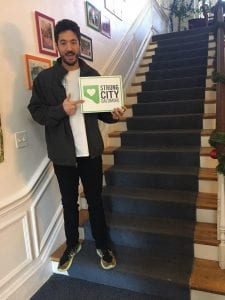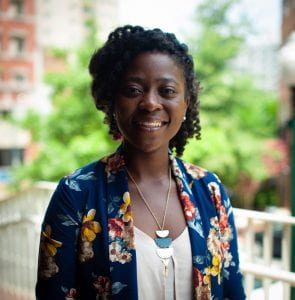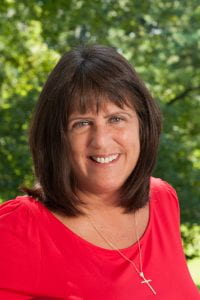Alumni put their business degrees to use to make the world a better place.
By Jenna Harrity
Everybody wants to make a difference in the world.
When we’re young, we’re often tempted by the prospect of fame. But, as we grow older, we settle for smaller, more direct impact: spending time with loved ones, passing our knowledge to a younger generation or volunteering at a local nonprofit.
We consider what is most important to us—the answers vary from person to person—and strive to improve our society through our work.
Three business administration alumni share what’s important to them and how they use their skills in business to make an impact at their nonprofit organizations—whether it’s behind the scenes managing operations or on the front line, interacting with community members. Each contributes a lasting impression on the people and the world they interact with daily.
NAME: Minju Zukowski
DEGREE & GRAD YEAR: Business Administration: Marketing, 2016
TITLE: Director
ORGANIZATION: 29th Street Community Center
Minju Zukowski’s resume includes an impressive portfolio of experiences, including City Year AmeriCorps, Global Health Corps Fellows and numerous local nonprofits. Where did they lead him? Right back where he started—Charm City. He is the director of the 29th Street Community Center.
Zukowski’s unwavering generosity and passion for helping others began with family admiration.
“My older brother sacrificed a lot to help me through college. As I achieved more at TU than I ever dreamed, I realized that I wanted to become who my brother was for me but for others,” he says. “I wanted to be a person who never gives up on someone they care about.”
“One of the most underrated skills in the nonprofit field is business.”
Zukowski now embodies that role to the center’s youth members.
“Our services help youth to realize the dreams they never thought attainable,” he says.
Located in East Baltimore and managed by the nonprofit Strong City Baltimore, the 29th Street Community Center provides free afterschool and summer programs for youth, connects them to employment and leadership opportunities and offers a safe space for families of all ages. As director, Zukowski regularly oversees staffing and programming to ensure the success of the center that welcomes roughly 450 members.
The families and young people Zukowski interacts with come to him for solutions and camaraderie. Nonprofit work certainly is not for the faint of heart, he says. It’s at the same time daunting and uplifting. He walks a thin line between the two.
“It sticks with you past 5 p.m.,” he says.
That’s why Zukowski is equally grateful to his staff members and volunteers.
“It’s an honor to work with such passionate individuals who sacrifice so much of their time, money and sanity to create a better world.”
While many days are surely unpredictable, Zukowski said his education at CBE has effectively prepared him.
“One of the most underrated skills in the nonprofit field is business,” he says. “Being able to create multiple streams of income at the center helps us diversify our funding and run our programs and initiatives.”
Zukowski earned a degree in business administration with a concentration in marketing. The marketing program taught him impactful lessons transferable to the nonprofit sector.
For students who are considering working for nonprofits, Zukowski recommends interning or volunteering with as many different organizations as they can. The more varied experiences students have, the more prepared they will be to face a plethora of daily problems. It is also beneficial, Zukowski remarks, to gain experience working at for-profit companies. Knowledge about finance, marketing and advertising can all be helpful and will make your resume stand out.
Zukowski also suggests using TU’s resources to create your own programs. During his senior year, he and a friend started a basketball and life skills program at the Boys & Girls Club. The experience gave them insight about management and fundraising; both of which, he says, prove valuable in his current role.
“We live in a very inequitable world where people are born into unjust and unfair living situations,” says Zukowski. “People face obstacles like poverty and racism, among others, every day. Like most who enter the nonprofit field, I want to make a difference in the world and give our members a stepping stone to ease their journey.”
NAME: Sandrine E. Emambu
DEGREE & GRAD YEAR: Business Administration: Project Management & Business Analysis, 2014
TITLE: Project Manager
ORGANIZATION: Catholic Relief Services
Sandrine Emambu wakes up each morning with a purpose. She asks herself, “What is something I am grateful for today?”
“Growing up in Cameroon in West Africa, I didn’t have a wealthy family,” she says. “You see poverty [in Cameroon]; you see suffering. Yet, I would say my family was always blessed. What we needed, God provided. I come from a big family that is rooted in faith and in the belief that hard work and determination will prevail.”
Emambu’s family prioritized three values: school, family and faith. After moving to the U.S., her mother worked three jobs to provide for the family. To ensure her mother’s hard work was not fruitless, Emambu developed a goal:
“Get a degree, genuinely learn from that degree, get a job and then remember where you came from.”
Emambu attended Towson University and graduated in 2014 with a degree in business administration and a concentration in project management and business analysis. She says her years at CBE were formative because of the numerous on-campus opportunities, including helping launch student-run Café Enactus.
“If my work has a direct, positive impact on people, for me that goes a long way.”
“It was just because I and a couple of other students had a crazy idea of saying, ‘we‘re business students. We want to become entrepreneurs one day. Why don’t we actually run a business on campus?’ We took entrepreneurial action to solve issues sustainably within our community. That’s what you learn in the CBE. You’re using the resources that you have on campus to truly make an impact.”
Emambu now puts her business degree and humanitarian passion to use at Catholic Relief Services (CRS)—an international relief agency headquartered in downtown Baltimore. As a project manager, Emambu enables better stewardship between CRS departments through the implementation of technology.
“How can you know how a program works without tracking tangible results?” Emambu asks. “The better we can improve our experience in the field, the more impactful our work will be. That’s something that CRS works on improving.
“This project impacts 100-plus countries,” she adds. “The key drivers are efficiency, effectiveness, engagement and ensuring you have the appropriate number of staff to get the anticipated results.”
For years, Embambu dreamed of working at CRS, she says. She applied nearly 20 times before landing the job.
“Because of my Catholic background, serving the poor has been a driving force in my personal mission,” she says. “If my work has a direct, positive impact on people, for me that goes a long way. And, to clarify, you don’t necessarily need to work in a nonprofit to have an impact on people.
“Just seeing how many people dedicate their lives to a specific mission, any mission, I think it’s such a beautiful thing.”
NAME: Laura Tester Meyer, MBA, CPA, CGMA
DEGREE & GRAD YEAR: Business Administration: Human Resource Management & Management, 1990
TITLE: COO & CFO
ORGANIZATION: The Obesity Society
Before Laura Tester Meyer became the nonprofit leader she is today, she worked for 20 years in the business sector. She made her career-altering transition at a pivotal time for nonprofits.
“It was a time when nonprofits were highly scrutinized by the public and needed systems for higher accountability,” says Meyer, noting that the standard for nonprofits altered from simply caring about the organization’s mission to making their efforts more global and transparent.
Sensing this shift, Meyer applied for a CFO position with the religious nonprofit, Associated Sulpicians of the United States and was hired by the Provincial Council.
“They needed someone with a master’s degree who understood the financial and accounting aspects of really running an organization,” she says. “They needed a professional.”
“Eighty-five percent of the work is the same as any other business or organization.”
Working for a nonprofit never crossed Meyer’s mind while she was pursuing her undergraduate degree. She was already working full time, helping build a startup in the manufacturing industry and raising her younger siblings simultaneously. She attended TU part time for seven and a half years to complete her bachelor’s degree. Meyer said the skills she learned in class and from her day job went hand in hand.
“I learned the soft skills in school and the hard skills at work,” she says. “So I always felt the two variables meshed together to increase the value of both.”
Meyer majored in business administration with concentrations in management and human resources. Her professors, mostly adjunct faculty members who taught night classes, encouraged her to incorporate workplace experiences in papers and academic discussions. She says this helped her two-fold: Her work was relevant in coursework, and her coursework benefited her work. Meyer feels that the skills she learned in dealing with people set her apart in the workplace.
While her professional experiences in finance and accounting propelled her into the nonprofit world, the skills she learned in dealing with people inspired her to stay.
“I always felt my education in management assisted me in understanding both board members and staff. The first group focused on the mission at a high level, while the latter operated more practically on a day-to-day basis,” she says.
Although Meyer says it’s often difficult to transition from for profit to nonprofit, she was able to breach the gate into nonprofit work because her experiences and education were desirable in both sectors.
“People think that you can’t understand a nonprofit organization unless you have background in it. Part of that is true; it is very different. But, at the same time, 85% of the work is the same as any other business or organization.”
Part of that remaining 15% has to do with motivation, says Meyer. In nonprofits, you find people who care very deeply for the mission. They don’t do it for the money unlike businesses, which must consider stakeholders and profits in addition to their mission.
“I was amazed to see the level of commitment and time given by unpaid volunteers—board members who are leaders of the organization in addition to their regular lives,” says Meyer. “That really threw me!”
Meyer is now the COO of The Obesity Society, the leading professional society focused on obesity science, treatment and prevention. The organization is going through similar changes to system accountability that originally brought her into the nonprofit industry. She works daily updating and installing systems ranging from association management systems (AMS) to public communications.
In her spare time, Meyer attends local networking events for business and nonprofit leaders.
“This area [Baltimore and D.C.] is fantastic for nonprofits. I try to fit as many networking events into my schedule as I can. Be visible,” she advises; “It’s the best way to be recognized in this community.”




